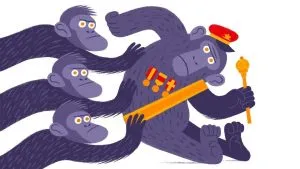 What other species can teach us about democracy
What other species can teach us about democracy
Early last year, more than 70 years after its publication, George Orwell’s Animal Farm appeared on The Washington Post’s best-seller list. A writer for the New York Observer declared the novel—an allegory involving a government run by pigs—a “guidepost” for politics in the age of Donald Trump. A growing body of research, however, suggests that animals may offer political lessons that are more than allegorical: Many make decisions using familiar political systems, from autocracy to democracy. How these systems function, and when they falter, may be telling for Homo sapiens.
Or take Botswana’s wild dogs. Although packs tend to follow the lead of a dominant pair, a lesser dog who’s keen to hunt can make its case through “rapid nasal exhalations”—essentially, sneezing. If other dogs are interested, they join in, holding a vote via sneeze. According to Reena H. Walker, one of the researchers who first wrote about this behavior, a group of 10 or more sneezing dogs can override the top dogs: At that point, Walker says, the dominant dogs “will have to jump on board” with the hunt.
Group decisions need not come easy—in fact, clashing perspectives may lead to superior outcomes. Seeley notes that bees make wiser decisions when they “have different backgrounds, bodies of knowledge, and experiences.” For example, nest-site scouts who have worked as foragers may explore areas where they’ve previously foraged—areas other scouts might not investigate. Variety among scouts thus encourages a wider array of potential sites, and more-thorough vetting of options. As long as animals share the same broader goal, a diversity of viewpoints does not tear their society apart but strengthens it, leading to better results for all.
Leave a Reply